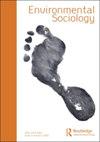Who is to blame? Nostalgia, Partisanship, and the death of coal
IF 2.8
Q3 ENVIRONMENTAL STUDIES
引用次数: 2
Abstract
ABSTRACT The U.S. energy sector has undergone significant changes in the last few decades with three converging trends – the implosion of the coal industry, the marked increase in domestically produced oil and gas, and the increasing viability of renewables. The implosion of coal has proven to be a contentious political issue, with conservative discourse placing the blame for the industry’s poor fortunes on the administration of former President Obama and federal environmental regulations. Coal occupies a unique space in the cultural imaginaries of the Rural U.S., with significant nostalgia for the industry despite its deleterious legacy. Our study is informed by the concept of community economic identity and recent research on right-wing populism. Using survey data from western Colorado collected in 2019, we evaluate how partisanship and nostalgia are associated with mischaracterizations of the causes of the coal industry’s decline. Republicans are more likely to state that former President Obama and federal environmental regulations are the primary cause of coal’s decline and less likely to state that alternative fuels are the cause. Nostalgia is also associated with naming President Obama and federal environmental regulations. Our results imply that the causes of coal’s collapse may not be well understood.谁该受到谴责?怀旧、党派之争和煤炭之死
摘要在过去的几十年里,美国能源行业发生了重大变化,出现了三种趋同趋势——煤炭行业的内爆、国内生产的石油和天然气的显著增加以及可再生能源的可行性不断提高。事实证明,煤炭的内爆是一个有争议的政治问题,保守派人士将煤炭行业糟糕的命运归咎于前总统奥巴马的政府和联邦环境法规。煤炭在美国农村的文化想象中占据着独特的空间,尽管它留下了有害的遗产,但人们对煤炭行业有着强烈的怀念。我们的研究借鉴了社区经济认同的概念和最近对右翼民粹主义的研究。利用2019年收集的科罗拉多州西部的调查数据,我们评估了党派偏见和怀旧情绪与对煤炭行业衰退原因的错误描述之间的关系。共和党人更有可能认为前总统奥巴马和联邦环境法规是煤炭产量下降的主要原因,而不太可能认为替代燃料是原因。怀旧也与奥巴马总统的名字和联邦环境法规有关。我们的研究结果表明,煤炭坍塌的原因可能还不太清楚。
本文章由计算机程序翻译,如有差异,请以英文原文为准。
求助全文
约1分钟内获得全文
求助全文
来源期刊

Environmental Sociology
ENVIRONMENTAL STUDIES-
CiteScore
4.60
自引率
12.00%
发文量
34
期刊介绍:
Environmental Sociology is dedicated to applying and advancing the sociological imagination in relation to a wide variety of environmental challenges, controversies and issues, at every level from the global to local, from ‘world culture’ to diverse local perspectives. As an international, peer-reviewed scholarly journal, Environmental Sociology aims to stretch the conceptual and theoretical boundaries of both environmental and mainstream sociology, to highlight the relevance of sociological research for environmental policy and management, to disseminate the results of sociological research, and to engage in productive dialogue and debate with other disciplines in the social, natural and ecological sciences. Contributions may utilize a variety of theoretical orientations including, but not restricted to: critical theory, cultural sociology, ecofeminism, ecological modernization, environmental justice, organizational sociology, political ecology, political economy, post-colonial studies, risk theory, social psychology, science and technology studies, globalization, world-systems analysis, and so on. Cross- and transdisciplinary contributions are welcome where they demonstrate a novel attempt to understand social-ecological relationships in a manner that engages with the core concerns of sociology in social relationships, institutions, practices and processes. All methodological approaches in the environmental social sciences – qualitative, quantitative, integrative, spatial, policy analysis, etc. – are welcomed. Environmental Sociology welcomes high-quality submissions from scholars around the world.
 求助内容:
求助内容: 应助结果提醒方式:
应助结果提醒方式:


